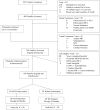Children of parents with a history of depression: The impact of a preventive intervention on youth social problems through reductions in internalizing problems
- PMID: 29229006
- PMCID: PMC5997498
- DOI: 10.1017/S0954579417001821
Children of parents with a history of depression: The impact of a preventive intervention on youth social problems through reductions in internalizing problems
Abstract
The current investigation examined if changes in youth internalizing problems as a result of a family group cognitive behavioral (FGCB) preventive intervention for families with a parent with a history of depression had a cascade effect on youth social problems over 24 months and the bidirectional nature of these effects. One hundred eighty families with a parent with a history of major depressive disorder (M age = 41.96; 88.9% mothers) and a youth age 9 to 15 years (49.4% females; M age = 11.46) participated. Findings from a panel model indicated that, compared to a minimum intervention condition, the FGCB intervention significantly reduced youth internalizing problems at 12 months that in turn were associated with lower levels of social problems at 18 months. Similarly, the FGCB intervention reduced internalizing problems at 18 months, which were associated with fewer social problems at 24 months. Changes in social problems were not related to reductions in subsequent internalizing problems. The findings suggest that reductions in youth internalizing problems can lead to lower levels of social problems. Youth social problems are difficult to change; therefore, targeting internalizing problems may be an effective way to reduce the social problems of children of parents with a history of depression.
Figures



Similar articles
-
Family group cognitive-behavioral preventive intervention for families of depressed parents: 18- and 24-month outcomes.J Consult Clin Psychol. 2011 Aug;79(4):488-99. doi: 10.1037/a0024254. J Consult Clin Psychol. 2011. PMID: 21707137 Free PMC article. Clinical Trial.
-
Coping and parenting: Mediators of 12-month outcomes of a family group cognitive-behavioral preventive intervention with families of depressed parents.J Consult Clin Psychol. 2010 Oct;78(5):623-34. doi: 10.1037/a0020459. J Consult Clin Psychol. 2010. PMID: 20873898 Free PMC article. Clinical Trial.
-
Reducing youth internalizing symptoms: effects of a family-based preventive intervention on parental guilt induction and youth cognitive style.Dev Psychopathol. 2014 May;26(2):319-32. doi: 10.1017/S0954579413001016. Epub 2014 Jan 17. Dev Psychopathol. 2014. PMID: 24438999 Free PMC article. Clinical Trial.
-
Nonsomatic treatment of depression.Child Adolesc Psychiatr Clin N Am. 2002 Jul;11(3):579-93. doi: 10.1016/s1056-4993(02)00009-3. Child Adolesc Psychiatr Clin N Am. 2002. PMID: 12222084 Review.
-
A Meta-Analysis of Program Characteristics for Youth with Disruptive Behavior Problems: The Moderating Role of Program Format and Youth Gender.Am J Community Psychol. 2020 Mar;65(1-2):201-222. doi: 10.1002/ajcp.12377. Epub 2019 Aug 26. Am J Community Psychol. 2020. PMID: 31449683 Free PMC article. Review.
Cited by
-
Maternal Error-Related Negativity Relationship With Offspring Error-Related Negativity and Negative Parenting Styles: A Novel Model of Internalizing Psychopathology Risk.Biol Psychiatry Cogn Neurosci Neuroimaging. 2022 Apr;7(4):435-442. doi: 10.1016/j.bpsc.2021.10.007. Epub 2021 Oct 21. Biol Psychiatry Cogn Neurosci Neuroimaging. 2022. PMID: 34688921 Free PMC article.
-
An intervention to improve the quality of life in children of parents with serious mental illness: the Young SMILES feasibility RCT.Health Technol Assess. 2020 Nov;24(59):1-136. doi: 10.3310/hta24590. Health Technol Assess. 2020. PMID: 33196410 Free PMC article. Clinical Trial.
-
Conceptualizing the social networks of children of parents with serious mental illness: a thematic analysis.Front Psychol. 2024 Jul 23;15:1383532. doi: 10.3389/fpsyg.2024.1383532. eCollection 2024. Front Psychol. 2024. PMID: 39108434 Free PMC article.
-
Developing an Intervention to Improve the Health Related Quality of Life in Children and Young People With Serious Parental Mental Illness.Front Psychiatry. 2019 Apr 9;10:155. doi: 10.3389/fpsyt.2019.00155. eCollection 2019. Front Psychiatry. 2019. PMID: 31024349 Free PMC article.
-
Mandatory Check for COPMI in Adult Mental Healthcare Services in the Netherlands-A Quantitative and Qualitative Evaluation.Front Psychiatry. 2022 Mar 18;13:807251. doi: 10.3389/fpsyt.2022.807251. eCollection 2022. Front Psychiatry. 2022. PMID: 35370848 Free PMC article.
References
-
- Achenbach TM, Rescorla LA. Manual for ASEBA schoolage forms and profiles. Burlington, VT: University of Vermont, Research Center for Children, Youth, and Families; 2001.
-
- Asher SR, Hymel S. Coaching in social skills for children who lack friends in school. Children & Schools. 1986;8(4):205–218. doi: 10.1093/cs/8.4.205. - DOI
Publication types
MeSH terms
Grants and funding
LinkOut - more resources
Full Text Sources
Other Literature Sources

